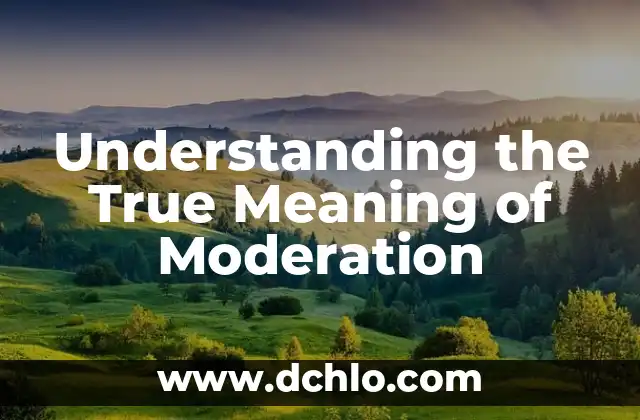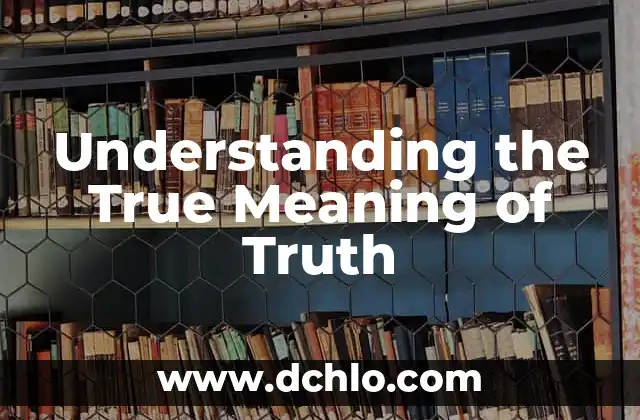Truth, a concept often synonymous with reality and authenticity, has been a cornerstone of human inquiry across various disciplines. From philosophy to science, the pursuit of truth has shaped our understanding of the world and ourselves.
What is the True Meaning of Truth?
Truth is a multifaceted concept that has been explored in philosophy, religion, and science. At its core, truth refers to the accuracy of a statement or the conformity of a statement with facts. Philosophers have debated its nature, with some arguing it is absolute and others relative.
Historically, ancient Greeks like Plato and Aristotle sought truth through reason and dialogue. Plato’s Theory of Forms proposed that truth lies in non-material abstract forms, while Aristotle emphasized observation and logic.
The Importance of Truth in Human Society
Truth plays a vital role in maintaining trust and integrity in society. It is the foundation of justice, education, and personal relationships. Without truth, societal structures would crumble, leading to chaos and mistrust.
También te puede interesar

In a world often driven by extremes, the concept of moderation emerges as a guiding principle for balanced living. This article delves into the significance of moderation, exploring its implications across various facets of life.

Baruch, a name of Hebrew origin, translates to blessed in English. This name carries deep cultural and religious significance, particularly within Jewish traditions. It symbolizes divine favor and joy, making it a cherished name across generations.

En un mundo lleno de sueños y aspiraciones, la frase wishes come true se ha convertido en un faro de esperanza para muchos. Pero, ¿qué significa realmente esta expresión? En esencia, se trata de la materialización de nuestros deseos, ya...
In philosophy, truth is central to ethics and metaphysics, guiding principles of right and wrong. In science, it is the pursuit of objective reality, driving technological advancements and medical breakthroughs.
Examples of Truth in Different Contexts
Truth manifests differently across various fields:
– Philosophy: The correspondence theory holds that truth corresponds to reality.
– Science: Truth is established through empirical evidence and replication.
– Law: Truth is sought through evidence and testimony to ensure justice.
– Personal Relationships: Truth builds trust and respect.
Each context underscores the universal importance of truth in human endeavors.
The Journey of Discovering Truth
Discovering truth is often a journey of inquiry and exploration. In science, the scientific method provides a structured approach to uncover truths about the natural world. Philosophers use reason and dialogue, as seen in Socratic methods, to explore deep questions.
This journey requires critical thinking, skepticism, and open-mindedness, leading to a deeper understanding of reality.
[relevanssi_related_posts]Theories of Truth
Several theories explain truth:
- Correspondence Theory: Truth corresponds to facts.
- Coherence Theory: Truth is consistent within a system.
- Pragmatic Theory: Truth is what works in practice.
Understanding these theories provides a framework for evaluating truth claims in different contexts.
The Essence of Reality
Reality, the essence of existence, is shaped by our perceptions and beliefs. Truth helps us navigate reality, distinguishing fact from fiction. It is the bedrock of knowledge, influencing how we interact with the world.
The Purpose of Truth
Truth serves to build trust, ensure justice, and expand knowledge. It fosters credibility in media and integrity in leadership, essential for a functioning society. Without truth, misinformation and deceit can dominate.
The Value of Authenticity
Authenticity, a synonym for truth, is crucial in personal and public life. It builds integrity, trustworthiness, and honesty, fostering meaningful connections and ethical behavior.
Truth Seekers and Progress
Truth seekers, from scientists to philosophers, have driven human progress. Their pursuit of knowledge and understanding has led to significant advancements, highlighting the importance of truth in innovation.
The Meaning of Truth
Truth encompasses accuracy, sincerity, and conformity to reality. It is a universal concept, vital in philosophy, science, and daily life, guiding our understanding and behavior.
The Origin of the Word Truth
The word truth originates from Old English trīth, meaning fidelity or loyalty. It is related to the Old Norse trú, signifying belief. Its evolution reflects the enduring human quest for authenticity and accuracy.
Honesty as a Fundamental Value
Honesty, closely tied to truth, is a cornerstone of ethical behavior. It involves sincerity in words and actions, essential for trust and respect in relationships and society.
Why is Truth Important in Daily Life?
Truth is essential in personal relationships, education, and professional settings. It promotes trust, accountability, and informed decision-making, enriching our lives and fostering a just society.
Using Truth in Everyday Contexts
Truth is applied in various ways:
– Personal Relationships: Honest communication strengthens bonds.
– Education: Accurate information aids learning.
– Media: Reliable reporting informs the public.
Examples include honest feedback, factual news reporting, and transparent governance.
INDICE

